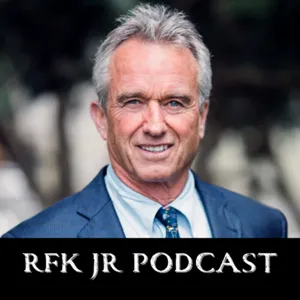Podcast Summary
Understanding the Intellectual Origins of Totalitarianism: Popper's 'The Open Society and Its Enemies' highlights the importance of recognizing historical context to resist totalitarianism's allure, as these ideologies often draw from deeply revered political theories in the Western canon.
Karl Popper's "The Open Society and Its Enemies" is a seminal work that delves into the philosophical roots of totalitarian and fascist ideas in Western thought. Popper, writing during World War II, was less concerned with diagnosing the present than understanding how such regimes gain intellectual justification. He argued that these ideologies often draw from deeply revered political theories in the Western canon, making their sales pitch all the more appealing. The episode emphasizes the importance of recognizing this historical context to better understand the potential for totalitarianism and resist its allure. It's a reminder that intellectual vigilance is crucial in safeguarding democratic values.
Transitioning from closed to open societies: Valuing scrutiny and individual responsibility: Open societies, like ancient Athens, foster individual responsibility, scrutiny, and the potential for progress, but also come with the burden of dealing with instability and making informed decisions.
The transition from closed societies to open societies, as described by Karl Popper, brings about greater individual responsibility and complexity. Open societies, like ancient Athens, value scrutiny and openness to better ways of governing. However, this comes with the burden of being an individual, making informed decisions, and dealing with the instability that comes from a society willing to change its mind. Popper also notes that this price is worth paying for the potential of a better society. Despite the challenges, it's essential for individuals in open societies to engage in the democratic process and contribute to shaping their collective future. Additionally, Popper argues that the open society's enemies, such as fascism and totalitarianism, thrive on the opposite – closed societies that stifle individuality and critical thought.
The tension between openness and stability in society: Open societies offer growth and progress but breed anxiety and instability, while closed societies offer certainty at the cost of limiting individual freedom and potential for progress. Plato's philosophy addressed this problem through ideal forms and philosopher-kings, but may have laid the groundwork for totalitarian thought.
The tension between openness and stability in society, as explored in the context of ancient Athens and Plato's philosophy, highlights the challenges and benefits of living in an open society. While openness allows for growth and progress, it also breeds anxiety and instability due to the vast number of options and potential for change. Conversely, a closed society offers a sense of certainty but at the cost of limiting individual freedom and potential for progress. Plato, influenced by the instability of Athens and the rigidity of Sparta, sought to address the problem of decay and corruption in society through his philosophy of ideal forms and the role of a philosopher-king in maintaining order. However, Popper argues that Plato's holistic approach to understanding and solving political problems may have laid the groundwork for later totalitarian thought in the West. Ultimately, the ongoing struggle between openness and stability continues to shape our understanding of political philosophy and the nature of society.
Holistic thinking and essentialism in politics can lead to inflexible systems: Popper warned against rigid political philosophies, emphasizing individual freedom and continuous progress in an open society
According to Karl Popper, holistic thinking and essentialism in political philosophy, as exemplified by Plato, can lead to inflexible and potentially oppressive systems that prioritize the collective over the individual. Meanwhile, historicism, the belief that history follows predictable patterns leading to a predetermined end, as held by philosophers like Hegel and Marx, can result in a dangerous disregard for individual freedom and spontaneity. Popper argued against these approaches, advocating instead for an open society that embraces uncertainty and continuous progress.
Critique of historicism by Karl Popper: Popper warned against relying on historical patterns to predict the future and advocated for a scientific and flexible approach to addressing complex issues
The belief in the end of history and the idea that we can predict the future based on historical patterns is problematic according to Karl Popper. He argues that this perspective, known as historicism, is a narrow and limiting way to view history and can lead to inflexible solutions for social and political problems. Popper believed that the focus should be on science and the accumulation of knowledge, rather than prophecy, to effectively address complex issues. He also warned against the dangers of delusion and the inability to predict individual decisions based on unknown future knowledge. Popper's critique of historicism emphasizes the importance of a scientific and flexible approach to understanding and shaping the future.
Popper's Open Society vs. Utopian Social Engineers: Popper advocated for an open society that values individual rights and freedoms, emphasizing trial and error, and being open to new evidence and revising beliefs.
According to Karl Popper, historicists, who believe they know the future and aim for utopian societies, lack the necessary humility to deal with unintended consequences of their policies. This makes them prone to becoming utopian social engineers, disregarding individual rights and freedoms in the name of the collective good. Popper advocates for an open society that sets free the critical powers of individuals and values personal decisions, resembling modern western liberal democracies. He suggests that our political strategy should be modeled after the scientific method, emphasizing trial and error, to make societies more effectively open. Popper is known more for his contributions to epistemology and philosophy of science, and his championing of falsification or the problem of induction, illustrated by the statement "all swans are white." The discovery of black swans challenged this assumption, highlighting the importance of being open to new evidence and revising our beliefs accordingly.
Striving for less wrong and more practical approaches in science and politics: Karl Popper advocated for a democratic state that allows for peaceful removal of bad rulers and focuses on practical, incremental improvements rather than utopian solutions in both science and politics
The goal of science and politics should not be to find absolute truth or utopian solutions, but rather to strive for less wrong and more practical approaches. In science, theories are not meant to be proven true, but rather falsifiable and open to improvement. In politics, the focus should be on creating a state where bad rulers can be peacefully removed, rather than debating who should rule in the first place. Karl Popper argued that the more important question is how to constitute a state where individuals have freedom and can express their opinions through democratic processes, preventing violent revolutions. However, even in a democratic society, problems cannot be solved through utopian social engineering, as the goals are often unrealistic and lead to inefficiency. Instead, solutions should be focused on practical, incremental improvements.
Focus on piecemeal social engineering: Instead of striving for utopian perfection, prioritize making small improvements to address concrete problems and reduce suffering in society
Instead of striving for unattainable utopian perfection, we should focus on piecemeal social engineering to address concrete problems in the real world. Karl Popper, a philosopher of science and politics, advocated for this approach, which involves making small adjustments and improvements over time, like a physical engineer refining a machine. This method allows for progress without requiring a collective fascist or totalitarian vision. Instead, we should prioritize reducing suffering in society, as human suffering appeals directly for help, unlike increasing happiness. Popper cautioned against utopianism and romanticism, as they often lead to attempts to impose one's values on others and force them to be happy, which is ineffective and inefficient in quantifying social progress.
Focusing on reducing suffering is more effective than pursuing happiness: Negative utilitarianism prioritizes minimizing suffering over happiness and democracy protects individual freedoms, making both crucial for a better society
While the pursuit of happiness is a noble goal, it is often elusive and difficult to quantify. Pragmatically, focusing on reducing suffering is a more effective approach, as it is a tangible issue that everyone can understand and relate to. Negative utilitarianism, which emphasizes minimizing suffering, is a more practical and achievable goal than striving for theoretical forms of happiness. Furthermore, democracy, despite its imperfections, is crucial for protecting individual freedoms and avoiding tyranny. Understanding the roots of totalitarian thought and being vigilant against it is essential for maintaining an open society. In the words of Karl Popper, "There is no magic 8 ball that we can shake up that's gonna tell us the future of the human species, and that's okay." Instead, we should focus on the present and work towards reducing suffering and protecting individual freedoms.
Become makers of our fate: Actively engage with complex issues and contribute to society instead of succumbing to lazy thinking.
Instead of waiting for prophets or external forces to shape our future, we have a responsibility to actively engage with the world and make our own fate. This means putting in the effort to understand complex issues and contribute to the betterment of society, rather than succumbing to lazy thinking. As the speaker eloquently put it, "we must become makers of our fate." This not only benefits ourselves, but also our fellow human beings, as we all work together to carry the strain of civilization. So let us strive to be proactive, engaged, and committed to creating a positive impact in the world.





